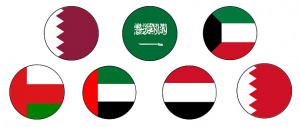Language/Gulf-arabic/Grammar/Gender
Hi Gulf Arabic learners! 😊
In this lesson, we will discuss Gender in Gulf Arabic. Understanding gender is essential to mastering the Arabic language. We will explore the different aspects of gender in Arabic such as masculine and feminine nouns, pronouns, and adjectives. After reading this lesson, you will be proficient in distinguishing the gender of various words and using them correctly. Let's get started!
Take a moment to explore these relevant pages as you conclude this lesson: Pronouns & Plurals.
Masculine and Feminine Nouns[edit | edit source]
In Gulf Arabic, every noun is masculine or feminine by its nature. There are no neuter nouns in Arabic. The gender of a noun usually depends on its form and meaning.
A noun for a male object like "boy" or "father" is viewed as masculine, while a noun for a female object like "girl" or "mother" is seen as feminine. Sometimes, it is based on the ending letters of the noun. For example, most singular nouns ending in "-a" are feminine, such as "كتابَة" (katāba - writing) and "شَجرة" (shajara - tree), and most ending in "-i" or "-u" are masculine, such as "كتابٌ" (kitābun - a book) and "بيتٌ" (baytun - a house).
Let's see some examples:
| Gulf Arabic | Pronunciation | English |
|---|---|---|
| وَلَد | walad | boy |
| بِنْت | bint | girl |
| رَجُل | rajul | man |
| اِمْرَأة | imra'a | woman |
Gulf Arabic has a linguistic feature called "broken plural." It is used when a noun is an irregular in its plural noun form, which does not follow the regular pattern of adding "ون" or "ات."
For masculine broken plurals, the singular noun endings "-ة" and "-ى" are replaced with the "-ين" or "-ي" endings in the plural noun, such as "كَتَاب" (kitāb - book) which becomes "كُتُب" (kutub - books).
For feminine broken plurals, the single noun ending with "-ة" is replaced with "-ات" in the plural noun, such as "قَلَم" (qalam - pen), which becomes "أَقْلام" (aqlām - pens).
Masculine and Feminine Pronouns[edit | edit source]
In Gulf Arabic, the personal pronouns are divided into masculine and feminine forms, depending on the gender of the person being referred to. Despite gender, there are some cases where both masculine and feminine pronouns are used.
| Pronoun | Pronunciation | English |
|---|---|---|
| أَنَا | 'anā | I |
| هُوَ | huwa | He |
| هِيَ | hiya | She |
| نَحْنُ | naḥnu | We |
| أَنْتَ | 'anta | You (masculine singular) |
| أَنْتِ | 'anti | You (feminine singular) |
| أَنْتُمَا | 'antumā | You (dual) |
| أَنْتُمْ | 'antum | You (masculine plural) |
| أَنْتُنَّ | 'antunn(a) | You (feminine plural) |
| هُمْ | hum | They (masculine) |
| هُنَّ | hunna | They (feminine) |
When using possessive pronouns, the masculine and feminine forms follow the same pattern as the pronouns.
Masculine and Feminine Adjectives[edit | edit source]
Adjectives in Gulf Arabic also follow masculine and feminine forms. They change according to the gender of the noun they are describing. The table below shows some examples:
| Gulf Arabic | Pronunciation | English |
|---|---|---|
| سَعِيد | sa'īd | Happy (masculine) |
| سَعِيدَة | sa'īda | Happy (feminine) |
| ذَكِي | dhakī | Smart (masculine) |
| ذَكِيَّة | dhakiyya | Smart (feminine) |
- Dialogue
Ahmed: هَلْ رَأَيْتُمُ الأُسْدَ في الزّوْجَة العربيّة؟ (Hal ra'aytumul-'us'ada fil-zawjah al'arabiyyah?) Did you see the lions in the Arab wife? Fatima: هَوْ أَحْمَق مِن الإجَابَةِ الغَبِيَّة هَهَهَه (Huw ahmaq min al'iijabah alghabiyyah hehehe) He is dumber than a stupid answer, hahaha.
- Practice Exercise
Write down the Gulf Arabic feminine form opposite pairs alongside the masculine forms: ُExample: Small-كبير (Kabir)
1. Short 2. Good 3. Easy 4. Long 5. Nice
Conclusion[edit | edit source]
In conclusion, gender is an essential aspect of the Arabic language, and it is important to understand how it operates in Gulf Arabic. Gender influences various parts of speech, including nouns, pronouns, and adjectives in Arabic. Practice and more reading can improve your understanding of gender in Arabic. To improve your Gulf Arabic Grammar, you can also use the Polyglot Club website. Find native speakers and ask them any questions!
Sources[edit | edit source]
- SEO tags
Well done on mastering this lesson! Don't miss these related pages to expand your knowledge: Give your Opinion & Adjectives.
➡ If you have any questions, please ask them in the comments section below.
➡ Feel free to edit this wiki page if you think it can be improved. 😎
Other Lessons[edit | edit source]
- Pronouns
- Personal Pronouns
- Adjectives
- How to Use Have
- Questions
- Conditional Mood
- Negation
- Give your Opinion
- Plurals
- How to Use Be

